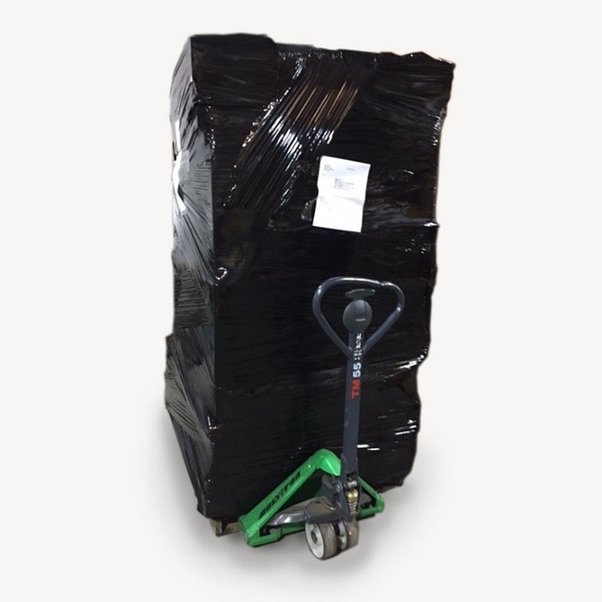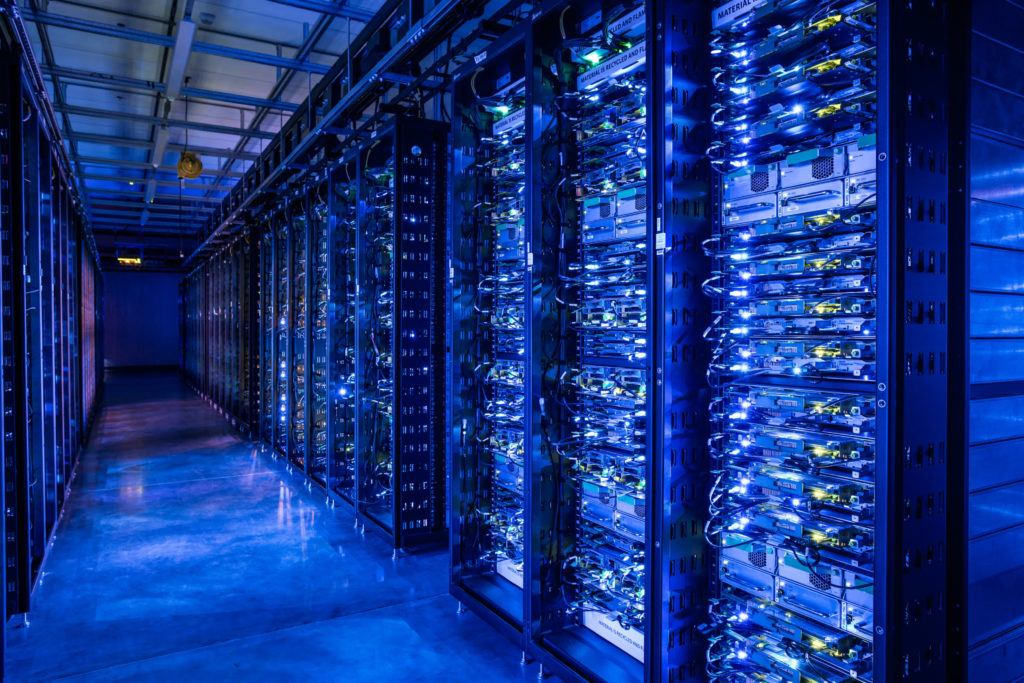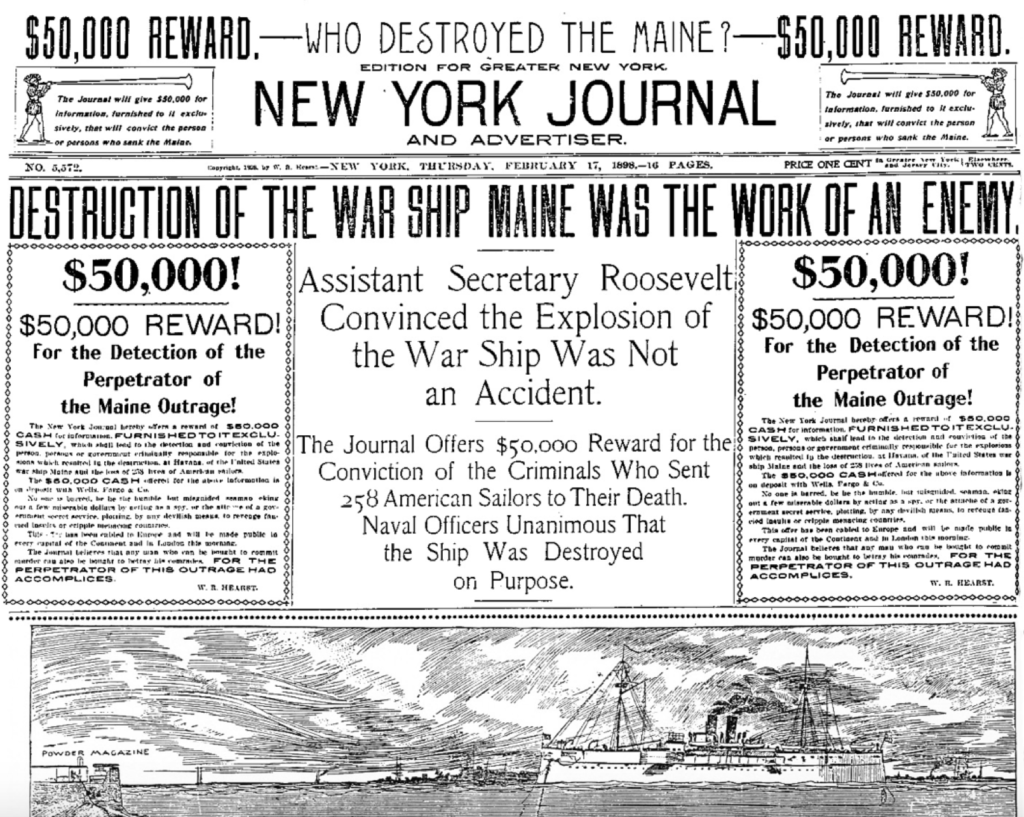Every month, almost three billion people use Facebook.
Those people upload photos and video and it all gets saved—about 4 petabytes, four billion gigabytes, of data every day.
Those are abstract numbers. What does it mean? How Does Facebook not run out of space?
Exactly how you think. They buy more than 1,000 hard drives every day. (As of the time I write this, the information I can find suggests they prefer to use 4TB hard drives rather than larger drives for cost and reliability reasons.)
This is a pallet of 180 hard drives:

Facebook adds the equivalent of about 6 of these pallets of hard drives to its storage hive every day. They’re placed in server computers in Facebook’s Hive data store that have 12 hard drives per server, so they’re adding data equivalent to at least 83 servers per day. (That’s only for storing user generated data like photos, and does not include extra drives for RAID redundancy or data duplication, which I imagine likely doubles that amount.)
Here’s the inside of one of Facebook’s data centers.

Imagine building after building, row after row of these. Now imagine 6 pallets of hard drives coming in on trucks and 83 servers’ worth of storage being added today.
And again tomorrow.
And again the day after tomorrow.
And again after that.
And yes, they really do order hard drives by the truckload.
This is why any time some conservative tells you “BuT fAcEbOk iS vIoLaTiNg My FrEeDuMb Of SpEeCh SoCiAl MeDiA sItEs ArE pUbLiC sPaCeS DuRr DuRr,” you can laugh in their face and walk away.
See all those servers? See all those buildings? See all those pallets of hard drives being trucked in? See all those people installing them?
Are you paying for them? No. Is the government paying for them? No. Is public money paying for them? No. They are private property. Billions of dollars of private property.
Facebook spends, as a first order approximation, about $30,000,000,000 a year on server infrastructure, not including buildings, land, facilities maintenance, installation, or salaries.
Anyone who thinks that social media sites are “public spaces” is welcome to propose that Congress gives Facebook $30,000,000,000 a year to keep up that infrastructure. Otherwise, no, it’s not. That’s $30,000,000,000 a year in private money being used to buy private property.
Okay, so.
You can’t have a service where almost three billion people communicate without having tremendous political clout. Facebook can, and arguably has, influenced elections and changed the course of nations.
And that’s (rightly, I think) got a lot of people worried. When you have a private company with no public accountability that has that much influence, that’s a bad thing, right?
Well, yes.
But here’s the thing: This isn’t new.
People forget this isn’t new. It’s always been this way. In the 1700s and 1800s, elections were decided by newspaper barons.
Remember William Randolph Hearst? Remember the Spanish American War? That was a war basically started by one man, a newspaper mogul, who totally dominated public political discourse and established a whole new world of journalistic propaganda.

This is probably the most effective fake news in history.
So what’s different?
Ah, now that’s a question.
Modern social media is different from the media empires of old in one important way: they are participatory, many-to-many, not one-to-many. In the past, “media” meant the owner disseminated information to content consumers. Today, we are all content creators and content consumers.
And this has led to a great deal of confusion betwixt “public” and “private.”
The Internet allows anyone to use it, but few people actually know how it works, or what scale it operates on. Hundreds of companies spend billions per year on the infrastructure to give everyone a way to communicate with everyone else, so what feels like a public square is actually a private space. And that leads to confusion: “Facebook banned me! My CoNsTiTuTiOnAl RiGhTs!“…when in fact you have no right to use other people’s stuff for free at all.
And make no mistake, that’s what Facebook and Twitter and all those other sites are: other people’s stuff. Billions and billions of dollars of other people’s stuff, that you’re using for free.
In the past, this confusion didn’t exist. In the past, nobody felt they had the right to someone else’s newspaper. You could write a letter to the editor, which they might or might not print, but nobody (well, nobody serious, anyway) had the notion that they had the Constitutional right to use someone else’s newspaper to say whatever they want.
We understand when something belongs to someone else, right up until the moment we’re allowed to use it ourselves…at which point we tend to assume an entitlement to it.
Owners of of media distribution companies have always had an outsized impact on social media. This isn’t new.
What’s new is that people are more aware of it, and want more of a voice. What’s unfortunate is that so many people aren’t going about it the right way. You don’t have a right to use Facebook, and if you’re kicked off you aren’t being “censored.”
What we need is entirely different conversation, and that’s one we can’t have whilst everyone is looking at the wrong thing.
